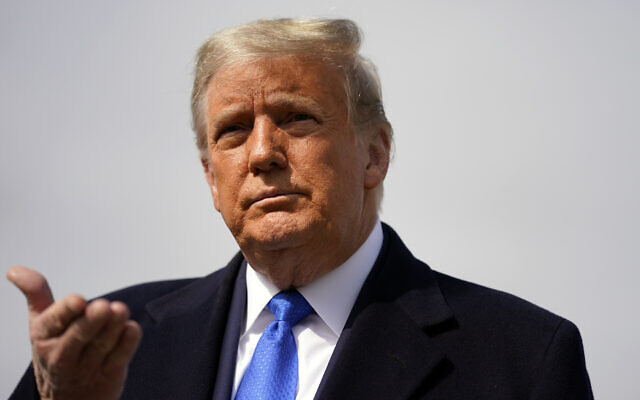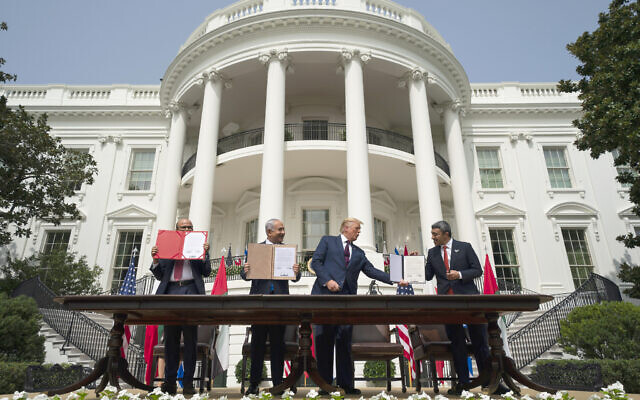President claims there are 5 Middle East ‘definites’ and a similar number who are ‘pretty much’ ready to open diplomatic relations

US President Donald Trump said Tuesday that there are up to 10 countries that he expects to soon normalize relations with Israel, but that the developments would largely happen after next week’s presidential elections.
Asked if there were more countries in the Middle East that would follow the United Arab Emirates, Bahrain, and Sudan who all recently opened diplomatic relations with Israel, Trump said there were more on the way, without specifying exactly how many or which countries they were.
“We have five, but really have probably nine or ten that are right in the mix, we’re going to have a lot, I think we’ll have all of them eventually,” he told reporters at Andrews Air Force Base before hitting the campaign trail.
“The beauty is there’s peace in the Middle East with no money and no blood,” he continued. “There’s no blood all over the sand. We have five definites and I think we’ll have another five pretty much definites. And all of them, the big ones, the smaller ones.”
Asked if agreements would come before or after the November 3 election, Trump said “largely after.”
— Donald J. Trump (@realDonaldTrump) October 27, 2020
On Saturday, Channel 12 news reported that Israeli officials believe an agreement with Oman could come in the near future, possibly even before the US election.
The station also reported that Mossad Chief Yossi Cohen has stated he believes Saudi Arabia will normalize ties with Israel, but will do so after the US election, to capitalize fully on such a decision with whoever is the next president.
The report said Israel believes any such Saudi decision will be cushioned by a significant arms deal with Washington, similar to the US agreement to sell advanced weaponry to the United Arab Emirates, which Israel has approved, but which has proven highly controversial in Jerusalem.
On Friday, Trump announced that Israel and Sudan would be making peace, and predicted that Saudi Arabia would soon follow.
During a call with Israel’s Prime Minister Benjamin Netanyahu, Sudan Sovereign Council president General Abdel Fattah al-Burhan and Sudanese Prime Minister Abdalla Hamdok, Trump brought reporters into the Oval Office and announced: “The State of Israel and the Republic of Sudan have agreed to make peace.”
He also told reporters there were another five countries “that want to come in.”
“We expect Saudi Arabia will be one of those countries,” Trump added, as he praised the country’s “highly respected” rulers King Salman and Crown Prince Mohammed bin Salman.
In the past, Trump has also mentioned the possibility of Kuwait normalizing with Israel.
Earlier on Tuesday, Defense Minister Benny Gantz referenced a Lebanese willingness for peace, though the remarks were made within the context of technical maritime border talks taking place between the enemy countries.

The last several months have seen a flurry of diplomatic activity as the US has brokered diplomatic pacts, known as the Abraham Accords, between Israel and the United Arab Emirates and Bahrain, who joining Jordan and Egypt as the only Arab countries to have official ties with Israel.
The Islamic Republic of Muaritania established diplomatic relations with Israel in 1999, but cut them off a decade later.
Netanyahu has made it a priority to forge ties with formerly hostile countries in Africa and the Arab world in the absence of any progress with the Palestinians during his more than a decade in office. Even before the Abraham Accords, Israel and the Gulf had formed a furtive united front against their common adversary Iran.
The recent normalization pacts with Israel have undermined the traditional Arab consensus that there can be no normalization with Israel before the establishment of an independent Palestinian state, angering Ramallah.
The Palestinians say the agreements amount to betrayal, while Israel says the Palestinians have lost what they have seen as their “veto” power over regional peace efforts.
As reported by The Times of Israel
